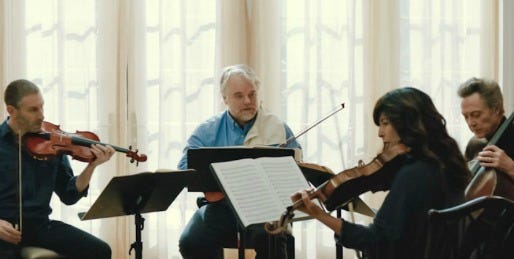A Late Quartet

Only a chosen few can spend their lives following their passion. It's a matter of time and circumstance as much as talent and dedication. However, anyone who's pursued performing arts will relate to "A Late Quartet." Though Yaron Zilberman's classical music indie has a rather odd bit of casting, its depiction of fate's effect on already-complex artistic temperaments is right on the money.
World-renowned string quartet The Fugue formed decades ago at Julliard and is going strong. When cellist Peter (Christopher Walken) is diagnosed with Parkinson's Disease, his retirement announcement sets a chain of events in motion. Second violinist Robert (Philip Seymour Hoffman) suddenly wants a bigger share of the spotlight and realizes his marriage to violist Juliette (Catherine Keener) has been lacking. Meanwhile, obsessive first violinist Daniel (Mark Ivanir) fights his attraction to his protegee Alexandra (Imogen Poots), an up-and-coming Julliard student — and Robert and Juliette's daughter.
Relationship dramas about the creative process always run the risk of narcissism and indulgence. Thanks to Zilberman's incorporation of action, music and documentary-esque film clips, "A Late Quartet" never falls into this trap. New York City is as much character as setting, the gray sky and blanket of snow mirroring the musicians' angst and confusion in the face of losing one of their own. Seth Grossman's screenplay is quiet and realistic, skillfully weaving together the tapestry of shifting interactions that form the group's history with a few chuckles thrown in for good measure.
"Quartet"'s principal actors clearly relish this project, resulting in subtle, thoughtful performances. It's nice to see Walken play a dignified teacher and father figure — in other words, something other than the self-parody he's become in recent years. Keener strikes the perfect balance of prickly and introspective, and Ivanir is wonderful as the consummate perfectionist who spends so much time in his own head, he hasn't quite mastered the art of conversation. (Anyone who's dabbled in the arts has encountered someone like Daniel.) Not surprisingly, Hoffman emerges as the film's standout, exploring Robert's descent from happy-go-lucky to searching for validation without ever chewing scenery. If there's one word for Hoffman as an actor, it's this: gracious.
The only problematic element of "Quartet" is Poots. Alexandra is a character that would have been played by Winona Ryder or Claire Danes 15 years ago, Julia Stiles or Natalie Portman a decade ago, or Anna Kendrick five years ago (maybe even now if Kendrick hadn't achieved mainstream stardom). Alexandra is an interesting young woman, frustrated with her parents' dedication to their art while willingly following in their footsteps. While Poots' interpretation is decent, I never believed her as Hoffman and Keener's daughter. For one, she doesn't resemble either, and even worse, her American accent is awful. It's possible Zilberman had a challenge finding an actress who was willing to work for scale and who didn't look too L.A., which speaks ill of the Hollywood system and its unnatural standards of beauty.
Casting hiccup aside, though, "A Late Quartet" resonates. When an artist leaves a group, amateur or professional, the absence is deeply felt. This past summer, a friend with whom I'd shared the stage and teaching duties at an arts camp decided to end his life. Though we hadn't acted together in many years — I don't even live in the area anymore — there's a gap now. It's the size of a man, and it will be smoothed over but never fully refilled.
[youtube http://www.youtube.com/watch?v=NX66lRnNmqs&w=514&h=315]



